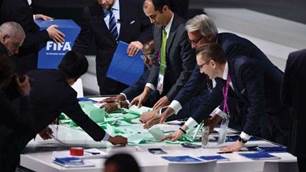The winners and losers from a busy month of sport.
LAST MONTH'S WINNERS IN SPORT
 The hit-and-giggle form of cricket is evolving past the "giggle" part. (Photo by Getty Images)
The hit-and-giggle form of cricket is evolving past the "giggle" part. (Photo by Getty Images)T20 cricket
Between the World Cup and the Big Bash League, this might be remembered as the breakthrough summer for T20 cricket. Not only in a commercial sense, but in terms of a mindset shift – that people who like to watch our favoured summer pastime want it in the 20-over form, and not because they’re grasping at novelty, entertainment or just want to take the kids out for a night. Indeed, the old hit-and-giggle is evolving past the “giggle” part – one day, we might find ourselves having to explain why Andrew Johns has stats from the “first-class” T20 comp – and the game’s administration should respond accordingly. One of the first things they can do is to treat T20 with more seriousness than it currently receives, and a major sign of that would be to end the practice of players being mic’d up during games. The players, among them Steve Smith and Dave Warner, have been pretty cool about it, but it’s beside the point – T20 doesn’t have to prove that it’s the more loose and fun form of cricket.
English anthem
FIFA
It’s crunch time for FIFA. As we went to press, there were five candidates for the presidency, to be decided this month by a member vote of the 209 federations who make up that disgraced organisation. But there were also appeals against bans pending for the disgraced former head Sepp Blatter and his UEFA cohort Michel Platini, which may yet see them return to the race ... as preposterous as that sounds, these men are not short of gall. In the lead-up to the vote, each candidate presented something of a “platform” for their election. Most mouthed the right concepts of “reform” and set up their websites. But beyond those few utterances from an uninspiring line-up, what we have got has been more of the same: more secret meetings behind closed doors between candidates where horse-trading was again on the agenda. It seemed that the nationality of the president was deemed more important than any agenda for reform. Despite his apparent credentials as an imprisoned colleague of Nelson Mandela, not to mention his fantastic name, South African contender Tokyo Sexwale offered little hope for a fresh start. “The time for alliances is coming,” he said last month before disappearing into hotel rooms in Doha to talk deals with rivals Sheikh Salman bin Ebrahim al-Khalifa (head of the Asian Football Confederation), and Gianni Infantino (general secretary of UEFA). The other two candidates, Jerome Champagne, a former FIFA deputy general secretary, and Prince Ali bin al-Hussein of Jordan, were rumoured to be somewhere thereabouts. Brace yourself, football. This is going to hurt.
AND THE LOSERS ...
 Lamine Diack (left) and Sebastian Coe, (Photo by Getty Images)
Lamine Diack (left) and Sebastian Coe, (Photo by Getty Images)IAAF
There’s pretty vigorous competition for worst sporting body in the world at the moment, but it’s hard to match the IAAF for sheer malfeasance. The second part of WADA’s independent report into the athletics organisation was as bad as potentially feared – not only a hive of systemic corruption, a la FIFA, but one that struck right at the heart of the governing body’s primary responsibility. Under former president Lamine Diack, the IAAF profited from covering up evidence of and not enforcing rules against widespread doping in Russian athletics. The report made a particular point that this was not a rogue element operating within the IAAF, like some wayward trader bringing down a bank; it came directly from the top levels of the organisation. And somehow, in the kind of doublethink that pervades international sports governance these days, the current IAAF head and former vice president under Diack, Sebastian Coe, has been called the right man to lead the sport out of this mess, given the seal of approval by one of the WADA report’s authors, Dick Pound. Whether a figure like Coe can rebuild confidence is very much an open question. Sportswear giant Adidas has given its answer, terminating a multi-million dollar sponsorship with the IAAF four years early.
Chris Gayle's "don't blush baby" interview
Essendon sympathy
Footballer misbehaviour
Related Articles

We need to formalise the ownership of bragging rights

FIFA earning high praise for its widespread reforms



.png&h=115&w=225&c=1&s=1)









